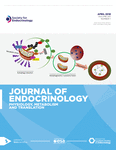- Made available online as an Accepted Preprint 3 March 2011
Bridging endometrial receptivity and implantation: network of hormones, cytokines, and growth factors
- Research Group in Molecular Oncology and Endocrinology, Department of Chemistry-Biology, University of Quebec, Trois-Rivieres, 3351, Boulevard Des Forges, CP 500, Trois-Rivieres, Quebec G8Y 5H7, Canada
- (Correspondence should be addressed to E Asselin; Email: eric.asselin{at}uqtr.ca)
Abstract
The prerequisite of successful implantation depends on achieving the appropriate embryo development to the blastocyst stage and at the same time the development of an endometrium that is receptive to the embryo. Implantation is a very intricate process, which is controlled by a number of complex molecules like hormones, cytokines, and growth factors and their cross talk. A network of these molecules plays a crucial role in preparing receptive endometrium and blastocyst. Furthermore, timely regulation of the expression of embryonic and maternal endometrial growth factors and cytokines plays a major role in determining the fate of embryo. Most of the existing data comes from animal studies due to ethical issues. In this study, we comprehend the data from both animal models and humans for better understanding of implantation and positive outcomes of pregnancy. The purpose of this review is to describe the potential roles of embryonic and uterine factors in implantation process such as prostaglandins, cyclooxygenases, leukemia inhibitory factor, interleukin (IL) 6, IL11, transforming growth factor-β, IGF, activins, NODAL, epidermal growth factor (EGF), and heparin binding-EGF. Understanding the function of these players will help us to address the reasons of implantation failure and infertility.
- Received in final form 31 January 2011
- Accepted 3 March 2011
- © 2011 Society for Endocrinology











